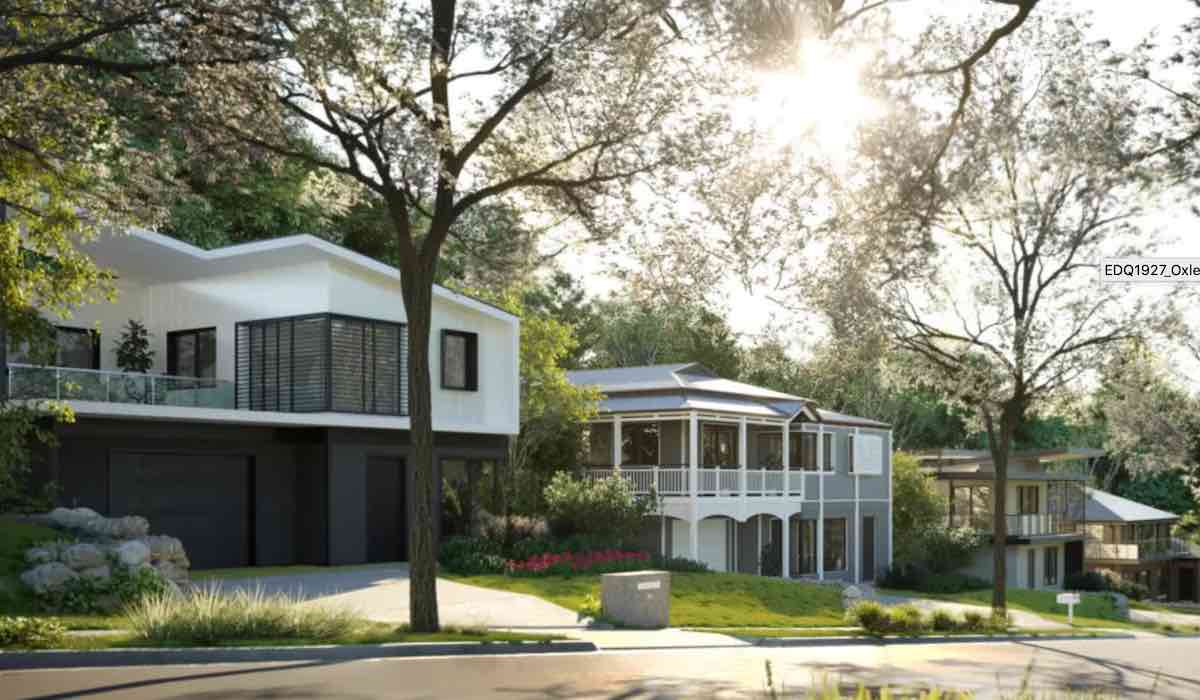

Source: Songbird Oxley


Two residential developments being built in suburban Brisbane will feature “futuristic” new homes fitted out with rooftop solar, battery storage and heat pump hot water systems, a standard the Queensland government hopes will become “the norm” in the state as it aims for net-zero emissions by 2050.
The state Labor government-led developments, one in Carseldine in Brisbane’s north and the other in the south-western suburb of Oxley, will include AlphaESS and Tesla Powerwall home batteries, respectively, with the Powerwalls offering the option to link to a virtual power plant.
Queensland deputy premier Steven Miles said both developments would demonstrate the use of innovation across different housing markets, with Carseldine Village featuring terrace homes and Songbird at Oxley catering for traditional detached homes.
“We’re hoping to inspire more home builders and developers to design and build sustainable, net zero emission homes across Queensland.”
The construction of new housing developments, and indeed whole new suburbs, with solar and batteries included off the plan is nothing new in Australia, but neither is it anywhere near as common as it should be. In this case, the fact that the developer is the state government, via Economic Development Queensland (EDQ), offers a promising sign that policy-makers might be close to pushing for higher standards from industry.
Certainly, this would be good news for consumers. The combination of the batteries, alongside the solar PV and other energy smart and efficient features – including being “electric vehicle charger ready” – is expected to save home owners at both the Brisbane developments between $1,600 and $2,000 a year on energy costs.
“All the Carseldine Village terrace homes and the Oxley Songbird detached residential dwellings homes will come with solar PV, battery storage systems, heat pump hot water systems, WiFi air conditioning and will be electric vehicle charger ready,” said Miles, who is also Queensland’s minister for state development.
“This could save owners up to $1600 per year off their power bills.”
That figure comes from an energy assessment that compared an average existing Brisbane home to a similar sized energy efficient terrace home at the Carseldine Village development, which will pair solar with an AlphaESS battery system.
The Oxley Songbird development, meanwhile, will tap a “landmark deal” with Natural Solar and Tesla that will offer on- and off-grid capability, and the option to link into a virtual power plant to generate extra revenue for the homebuyer, said Miles.
“This is incredible technology which will mean that in the event of a Queensland storm or power-outage in Oxley, these homes will still have power, so they will be able to use their fridge, lights, and favourite streaming service,” the deputy premier said.
Natural Solar CEO Chris Williams said the solar and battery systems, and other features of the homes, would deliver savings of up to $2000 a year for home owners, offering a return on investment in around five years.
Queensland’s relatively new minister for energy, renewables and hydrogen, Mick de Brenni said the “futuristic homes” would also help ensure that Queensland reached its renewable energy target of 50% by 2030.
“We know that Queenslanders want smart, efficient homes that run on clean energy because ultimately it will save them money,” de Brenni said.
“As we move to a carbon-neutral future this sort of housing design is something that we are working towards becoming the norm across Queensland with updates for the National Construction Code in the pipeline.”
As noted above, new housing developments offering solar and battery storage as the standard are becoming increasingly common around Australia, although most of them still with the backing of either state or federal government grants or schemes.
A recent example is the ARENA-backed project by Fraser’s Property Australia that will build 51 all-electric, solar homes that will generate more power than they consume, starting with a $1.42 million net-zero energy housing project in south west Sydney.
That project, called Ed.Square, will build 51 medium density Balanced Energy Homes – or BE.Homes – in the suburb of Edmondson Park that will integrate a suite of renewable energy, electrification and energy efficiency measures, including 4kW of solar PV, ground source heat pump space conditioning, and electric boosted solar hot water.
In Victoria, a 460-home collaboration by Villawood Properties and state-owned utility South East Water offered home buyers the option of 5kW of rooftop solar, plus battery storage provided by sonnen.
Both developments in Brisbane, Songbird and Carseldine Village, are open to buyers or expressions of interes. House prices start at $462,050 at Carseldine and at $480,000 at Songbird.
Sophie is editor of One Step Off The Grid and deputy editor of its sister site, Renew Economy. Sophie has been writing about clean energy for more than a decade.
This post was published on January 25, 2021 11:39 am
Report warns excluding cooktops from residential gas phase-out could take a big bite out of…
US energy economist says we have got our electricity tariffs all wrong, by focusing almost…
Wayne Smith from the Smart Energy Council on what to expect from the federal home…
OpenSolar joins forces with LoanOptions.ai to help consumers access finance to invest in rooftop PV…
Both major political parties are being urged to cut the price of household solar batteries…
Solar expansion project at major Australian airport takes it past its target to self-generate 15%…